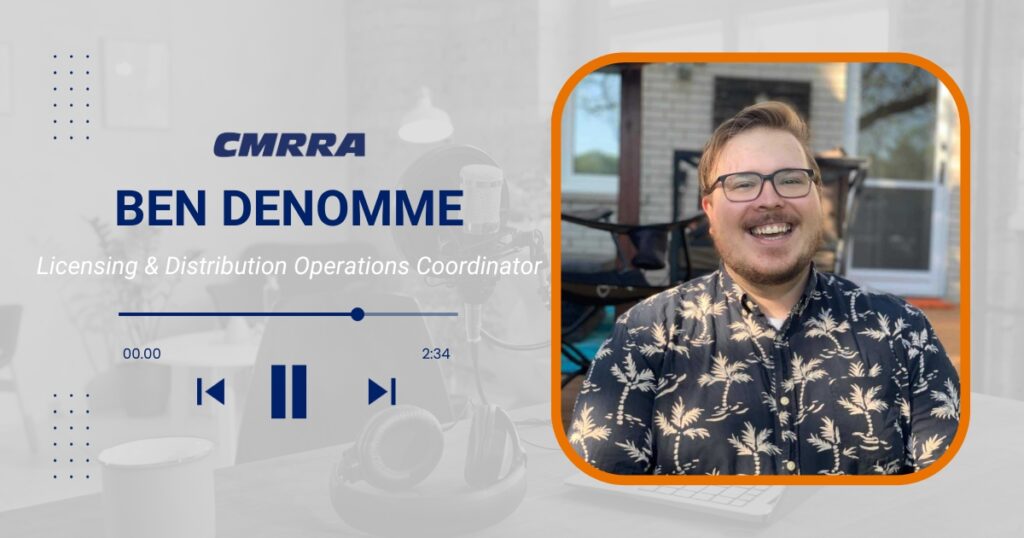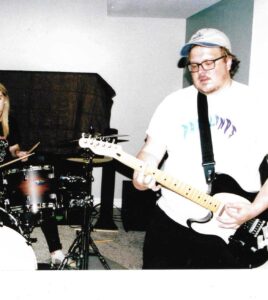This month’s Front of House is Ben Denomme. Ben started his CMRRA journey as an intern through the Music Business Program at Humber College and has since become our Licensing and Distribution Operations Coordinator. His role focuses on licensing products for labels, coordination of work across multiple departments, and special projects.

In 2020, you started your CMRRA journey as an intern as part of the Music Business Program at Humber College. Since then, you’ve held a few different positions and are now the Licensing and Distribution Operations Coordinator. Can you tell us about this role and what your day-to-day looks like?
The Licensing and Distribution Operations Coordinator is a relatively new role at CMRRA, and as such my responsibilities have evolved over the role’s own evolution. On a regular basis I assess workflow priorities for the mechanical royalties team who deal with the licensing of physical products for major and independent record labels. This includes assigning specific sets of workflows, as well as coordinating with the supervisors and managers on setting priorities and ensuring that our workflow goals are achieved according to specific deadlines. A big part of my day-to-day is spent working on special projects that support CMRRA’s business operations, as well as the coordination of work across multiple departments/teams. I also chip in to help out with certain tasks during peak periods of activity.
What sparked your interest in learning to play the bass? Was there a particular moment or influence that motivated you to pick up this instrument?
I started learning guitar when I was about 13 in order to emulate the musicians that I loved at that time, who happened to mostly be in 80’s hardcore punk bands. After a while, I realized that I had very little talent for the guitar (which, to be fair, is less necessary for punk), and I started playing bass instead. It wasn’t any easier, but I much preferred the tonal range of the bass; this coupled with the fact that I had gotten into somewhat more complicated music in the form of first to third-wave emo meant that I was enjoying the basslines of songs much more than the lead guitar. Bands like Sunny Day Real Estate, Penfold, Crash of Rhinos, and Mineral, along with masters of the craft like Jaco Pastorius made me realize that the bass was much more my speed.
You are a frequent listener of CIUT-FM, a campus and community radio station owned and operated by the University of Toronto. How did you discover this station and what bands or artists have you found through listening?
CIUT-FM, as well as the other campus radio stations in Toronto, tend to have a much broader scope when it comes to their programming. For instance, “Equalizing Distort” which plays at a high traffic time of 10pm-12am on Sunday nights, was my first foray into the Toronto DIY punk scene. I was introduced to the show when trying to find musically aligned friends on campus during my time at the University of Toronto, and from it I found out about Not Dead Yet and Faith/Void (RIP). Not Dead Yet puts on a huge number of shows in Toronto, and they are not limited to punk, but will put up DIY and obscure artists of any genre. They used to run their own festival, but when it ended, they wrote a nice article about the other festivals in Toronto that might be comparable, which is where I found out about New Friends Fest (NFF). NFF is an annual festival running since 2017 and features primarily screamo bands from Toronto and around the world. Their last iteration of the festival was this past August long weekend, and pageninetynine capped off the Sunday show with a huge set, their first in Canada. Soul Glo, City of Caterpillar, Loma Prieta, and many other staples of the genre have played the fest during its tenure.
If you had to pick one album to listen to for the rest of your life, which one would it be, and why?
Despite all my responses being mostly punk/alternative music based, the album I would probably listen to for the rest of my life would be Giant Steps by John Coltrane. The titular song is obviously a masterpiece, but I find that the whole album has so much to say, and so many little details, that I could discover even after 1000 listens. Syeeda’s Song Flute has such an impressive and simple hook, and yet it never gets tired. The band on Giant Steps has undeniable pedigree, with Paul Chambers, Art Taylor, and Tommy Flanagan on most of the tracks.
Thinking about becoming a client of CMRRA? Already a client but have questions? Email us at [email protected] and we’ll get you the answers you need.



